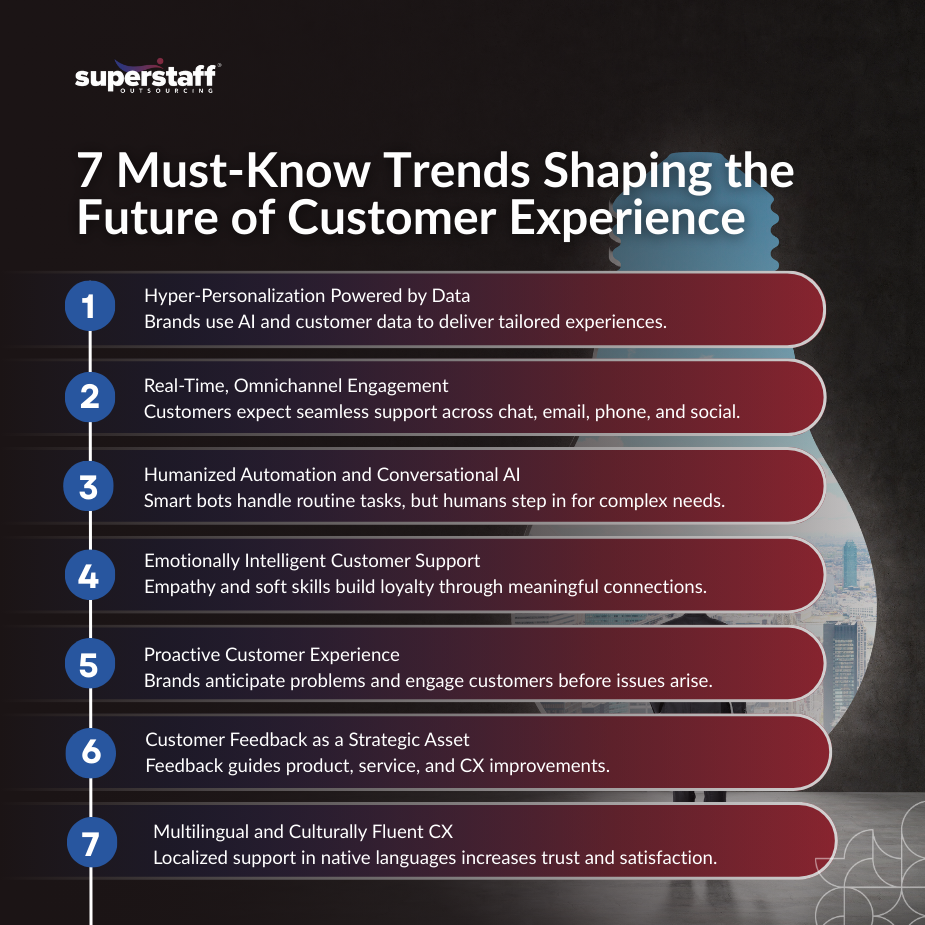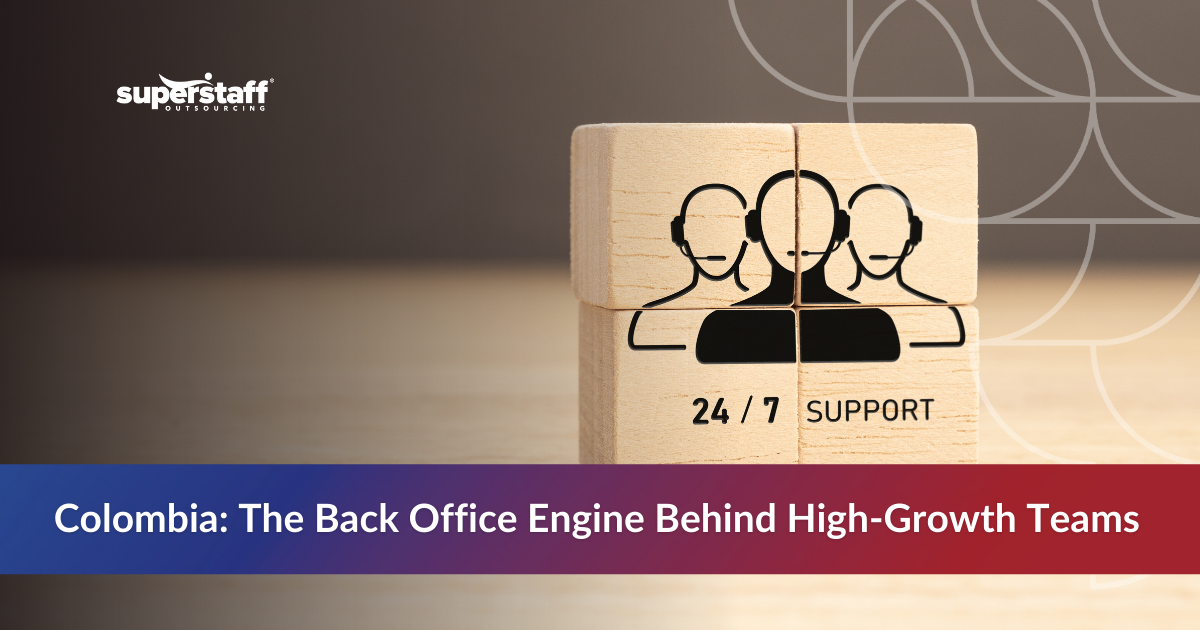
Customer experience is no longer a cost center; it’s a growth engine. In 2025 and beyond, how your customers feel about your brand will define your market position, shape your revenue trajectory, and determine your long-term relevance. As technology evolves and consumer behavior becomes increasingly complex, the future of customer experience is being rewritten in real time.
From AI-driven personalization to real-time omnichannel support, today’s customers expect seamless, emotionally intelligent, and always-available interactions. And if they don’t get it? They move on. Fast. The pressure is on for businesses to not only keep up but to lead.
To stay ahead, business leaders must not only understand these trends but implement them with clarity, precision, and scale. This blog explores seven of the top customer experience trends for 2025 and shows how outsourcing, especially to skilled teams in the Philippines and Colombia, can help companies respond with agility, reduce operational strain, and drive loyalty through better service.
1. Hyper-Personalization Powered by Data
Today’s customers expect brands to know them intimately and instantly. This is why hyper-personalization is among the key CX trends in 2025.
Thanks to AI, machine learning, and real-time data analytics, brands can now tailor every touchpoint to individual preferences and behaviors. The future of customer experience lies in relevance, not just reach. Consumers want offers, messages, and solutions that reflect who they are, what they’ve purchased, and what they might need next.
- Predictive analytics helps forecast customer needs based on historical behaviors.
- CRMs and personalization engines fuel unique customer journeys.
- Outsourced teams can be trained to manage these tools, ensuring real-time execution of personalized campaigns and support flows.
Outsourcing to CX teams well-versed in tools like HubSpot, Salesforce, or Zendesk allows companies to scale hyper-personalization without overwhelming internal teams.
While personalization leads the pack, another key shift is already reshaping how customers communicate.
2. Real-Time, Omnichannel Engagement
Customer experience isn’t limited to one channel—it’s everywhere, all at once.
Customers now expect fluid transitions between live chat, email, voice calls, SMS, and social media—without having to repeat themselves. According to research, 90% of customers want consistent interactions across all channels.
- Outsourced teams provide 24/7 coverage across platforms, ensuring no touchpoint is left unmanned.
- Nearshore solutions, particularly in Colombia, offer time zone alignment that supports seamless real-time engagement for North American customers.
The future of customer experience is defined by accessibility and consistency. Outsourcing empowers brands to meet customers wherever they are, whenever they need support.
Next up: the return of human empathy in digital interactions.
3. Humanized Automation and Conversational AI
AI is growing smarter, but the human touch still matters.
Customers may appreciate speed, but not at the expense of warmth. This is why the most successful CX strategies are blending conversational AI with human escalation paths. An AI voice call agent can handle FAQs and repetitive queries, while trained agents step in for nuanced, emotional, or complex situations.
- Outsourcing partners with conversational AI capabilities can manage implementation and monitoring.
- Support agents are trained to take over seamlessly when automation isn’t enough.
The future of customer experience is hybrid: automated when it can be, human when it needs to be. Partnering with CX experts ensures you strike the right balance.
Alongside tech evolution, CX strategies must also embrace emotional intelligence.

4. Emotionally Intelligent Customer Support
Empathy is the new currency of customer loyalty.
Even in digital-first environments, human connection remains a key differentiator. Training outsourced teams on soft skills such as active listening, tone modulation, and emotional validation allows brands to deliver care that feels human—even when delivered remotely.
- Empathy-driven call scripts, QA systems, and coaching build meaningful rapport.
- Offshore teams in the Philippines are particularly well-regarded for their cultural alignment with Western markets, making emotional intelligence a natural advantage.
The future of customer experience isn’t just functional; it’s emotional. Customers stay loyal to brands that make them feel seen and heard.
With empathy at the core, companies are also doubling down on feedback.
5. Proactive Customer Experience
Great CX doesn’t wait for problems—it prevents them.
Reactive support is no longer enough. Brands that want to retain customers must identify issues before they occur and reach out with solutions or guidance. Predictive analytics is key, but so is the team executing that insight.
- Outsourced CX agents trained in retention strategies, upselling, and churn reduction can drive measurable results.
- CRM monitoring and automated alerts enable real-time interventions, supported by round-the-clock teams.
Proactivity reflects confidence and attentiveness—two traits customers love. In the future of customer experience, outreach is as important as response.
Let’s not forget how customer feedback itself is becoming more influential.
6. Customer Feedback as a Strategic Asset
The best CX strategies are now co-created with customers.
Feedback isn’t just about measuring satisfaction—it’s about guiding growth. Today’s leading companies are using NPS, CSAT, reviews, and social listening not just to listen, but to act.
- Offshore QA teams can analyze feedback trends, tag root causes, and suggest improvements.
- Voice-of-the-customer programs, managed by BPO partners, help turn qualitative insights into strategic changes.
The future of customer experience depends on listening systems that are both structured and scalable. Outsourcing these functions ensures consistent monitoring and reporting.
Finally, with global markets expanding, localization has never been more important.
7. Multilingual and Culturally Fluent CX
Customer experience goes global—so must your support team.
As companies scale internationally, they must support diverse customer bases with sensitivity and skill. This means offering help in native languages, understanding regional norms, and adjusting tone accordingly.
- Nearshore solutions in Colombia offer fluency in English and Spanish, a major asset in serving North American and Latin American customers.
- Filipino agents are known for their adaptability, strong English proficiency, and customer-first approach.
The future of customer experience is inclusive, multilingual, and culturally aware. Outsourcing enables rapid access to this level of service without the burden of internal hiring.
Now that we’ve explored the future, how can companies take action today?
Embrace the Future of Customer Experience By Partnering With Outsourced CX Professionals
The future of customer experience is already here—and outsourcing can help you lead it.
From hyper-personalization and omnichannel engagement to empathy-driven support and multilingual fluency, every trend highlighted in this blog points to one truth: delivering exceptional CX requires agility, deep skill, and scalable solutions.
Outsourcing to trusted partners in the Philippines and Colombia enables business leaders to implement these trends quickly, cost-effectively, and at scale. Whether you’re aiming to enhance automation, expand support hours, or humanize every interaction, your outsourced CX team can help you stay competitive.
Explore how SuperStaff can help you boost your customer experience strategy and stay competitive with a global, future-ready team. Reach out to learn more.






